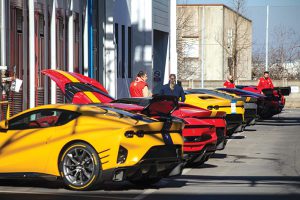BLOOMBERG
Two of Europe’s most venerable names in the car industry, Porsche and Ferrari, are surfacing in an European Union (EU) debate about a plan to kill the combustion engine — and they’re changing the conversation.
The luxury sports-car makers are seeking a carve-out for synthetic electro-fuels, or e-fuels, from the EU’s planned 2035 ban on new internal combustion engine vehicles. While they belong to a narrow segment of the auto industry, Porsche and Ferrari’s status as national icons was enough to move their governments to challenge the EU plan last week just days before a scheduled vote.
The move shook Brussels, and reopened questions around supposedly climate-neutral e-fuels that have proven too costly for large fleets of vehicles. But it also revealed deeper questions about the economic and social forces at play in Europe’s transition to green tech.
European Commission President Ursula von der Leyen is set to meet Chancellor Olaf Scholz on the side-lines of a German cabinet meeting on Sunday, where the e-fuel issue will likely be discussed.
Cars are at the cultural core of Germany, which remains the only European nation with no speed limits on stretches of its famed autobahn — a perennial thorn for environmentalists. And opposition to the proposed EU law illustrates the nation’s reluctance to bid farewell to some of its quintessential symbols, like Porsche’s roaring 911.
But the efforts to slow the EU law at such a late stage has stoked criticism within the auto industry. With manufacturers pouring billions into bringing electric cars to market, many don’t want distractions from an expensive potential alternative.
While most carmakers are pouring tens of billions into the EV shift, Porsche has also invested in an e-fuel plant in Chile, partly because the manufacturer doesn’t plan to make its 911 sports car with a plug. Operating combustion-engine vehicles in a climate-neutral way could also help speed up the decarbonization of the transport sector, according to a Porsche spokesman. Existing vehicle stock should be included in the push to lower CO2 emissions faster, he added. Ferrari has said it’s pursuing alternative fuels to keep making combustion-engine cars that preserve its heritage.
Proponents of e-fuels, say they’re essentially renewable electricity that’s been converted into a combustible, liquid fuel. To make it, scientists combine captured carbon dioxide with hydrogen that was split from water in a process powered by renewable energy, creating a synthetic hydrocarbon fuel. When burned in a combustion engine, the e-fuels create carbon dioxide. But since it was made from previously captured CO2, they argue it’s climate neutral.
The technology is attracting particular interest in Germany, where the Fischer-Tropsch process that is still the foundation of e-fuels was invented in 1925. The method allowed Germany’s oil-starved military to create substitute liquid fuels from coal during World War II.
For future German and Italian sports cars, the superior power-density of such fuels, compared to the lithium-ion batteries in electric vehicles, would mean automakers can continue to produce lightweight sports cars that are nimble through corners with roaring engines and crackling exhausts.
Formula 1, the world’s premier motor-racing competition, will switch to synthetic fuels for the 2026 season. While the move won’t make a dent in the sport’s overall emissions — 99% of which come from non-racing car sources like air travel to races across the world — they’ll help to prove that synthetic fuels can power high-performance automotive engines.
Unless they’re saved by e-fuels, the bell is tolling for combustion engines. While the likes of Mercedes-Benz AG and BMW AG have teams working on a new generation of combustion engines to comply with the Euro-7 emissions regulations that will come into force in 2025, there are no plans or funding for a generation beyond that.
Some in the industry are concerned that an e-fuel exception — even if limited to some sports cars — could blunt the impact on the auto industry from a clear 2035 ban on combustion engines.
 The Gulf Time Newspaper One of the finest business newspapers in the UAE brought to you by our professional writers and editors.
The Gulf Time Newspaper One of the finest business newspapers in the UAE brought to you by our professional writers and editors.
